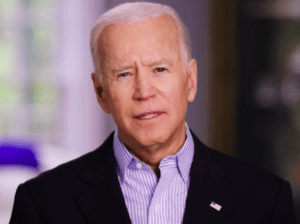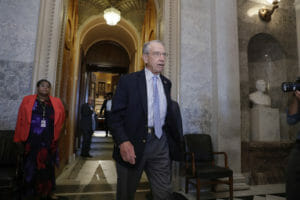Victims Gain a Voice to Help Guide Purdue Pharma Bankruptcy
Four people touched by addiction are on a bankruptcy committee that will help decide Purdue's fine and potentially, how that money will be spent. Toby Talbot / AP
Toby Talbot / AP
Victims of opioid addiction weren’t in the room when OxyContin maker Purdue Pharma persuaded half the state attorneys general to settle claims over the company’s role in the nationwide overdose epidemic.
Now that Purdue is in federal bankruptcy court, four people whose lives were touched by addiction have important seats at the table — and could force fundamental changes to the tentative deal. They are part of a bankruptcy committee that will play a major role in deciding how much Purdue will pay and potentially how that money is to be spent.
The committee can investigate Purdue’s operations and possibly even go after more money from the members of the Sackler family who own the company. They will play a central role in evaluating the tentative settlement reached by the attorneys general representing roughly half the states.
The four are a mother and a grandfather of children born dependent on opioids, a man in recovery from addiction and a mother who lost a son to overdose. Together, they could be an emotionally persuasive minority on the nine-member Official Committee of Unsecured Creditors appointed by the U.S. trustee overseeing the bankruptcy.
“There’s not a shy person in the bunch,” said addiction treatment advocate and lobbyist Carol McDaid, who attended the hearing when the committee candidates were interviewed and chosen. The four victims know how to make their voices heard, she said.
It’s unusual for a creditors committee to include private citizens. The other members are more typical: a medical center, a health insurer, a prescription benefit management company, the manufacturer of an addiction treatment drug and a pension insurer.
The committee can hire lawyers and financial experts paid for by the debtor — in this case, Purdue, said Robert Dammon, dean of the Tepper School of Business at Carnegie Mellon University. It can investigate issues such as the company’s value and even whether the Sackler family has improperly taken money out of it — something some state attorneys general are investigating.
Opioids, including prescription drugs and illegal ones such as heroin and illicitly made fentanyl, have been linked to more than 400,000 deaths in the U.S. since 2000. Thousands of infants have been born to mothers who were taking opioids while pregnant, and two committee members represent those children.
Kara Trainor is a mother of a child born dependent on opioids. Walter Lee Salmons, a grandfather, is helping raise two affected children. Ryan Hampton is an activist in recovery from opioid addiction. Cheryl Juaire lost her 23-year-old son to a heroin overdose after he became addicted to prescription painkillers.
They have been asked not to publicly discuss the bankruptcy case.
Some of the victims are veteran protesters who will need to channel the emotion of their personal stories in a different way. Juaire, whose son overdosed in 2011, regularly tells reporters she’d like to see the Sackler family in jail.
Now they’ll need to be practical, said Gary Mendell of Shatterproof, a national nonprofit working on addiction issues. Mendell, an entrepreneur who lost his son to addiction, has used his personal story to influence policies at the state and national level.
“It is connecting with people emotionally about a family that’s been shattered — and once you’ve connected emotionally, crafting practical approaches to sparing other families that same tragedy,” Mendell said.
McDaid said victims usually get “a token seat” at the table.
“Then they pat you on the head and give you an award later,” she said. “This could be very meaningful. There could be some justice.”
McDaid said “it will be a win” if the bankruptcy leads to investments in addiction treatment infrastructure and support for people in recovery such as housing and education “so people can get and stay well.”
Purdue is facing some 2,600 lawsuits over the toll of opioids, most of them filed by local governments. The company has accounted for a relatively small percentage of overall opioid sales, but its drug OxyContin is perhaps the best known prescription opioid. Several other drugmakers, distributors and pharmacies are facing most of the same lawsuits.
It’s not exactly clear how much clout the committee could have in such an unusual bankruptcy case.
“They can bring to court problems with what the debtor is trying to do,” said Lindsey Simon, a University of Georgia School of Law bankruptcy expert. “They have leverage.”
But she noted a judge does not have to do what the committee wants. Even though the thousands of state and local governments suing Purdue are not seated on this committee, they can give input into how the case should go.
The committee has been meeting virtually every business day by phone since it was formed toward the end of last month, according to a court filing made Saturday by the committee’s attorneys. It is expected to look out for the interests of all parties to whom Purdue owes money; so far, most of the attention in the case has been on the Purdue settlement talks with state and local governments.
“The public litigants have dominated the press for the past year or so … and there has been less press regarding the private litigants — and perhaps an inclination to discount the size and importance of those claims. Doing so, however, would be unfair, and contrary to the facts,” the committee’s attorneys wrote. “Collectively, the amount of the private litigants’ claims is vast — just like the public litigants.”
One of the committee members, for example, is Blue Cross and Blue Shield Association, which represents a network of Blue Cross Blue Shield companies that provide health care coverage to one-third of all Americans, according to the court filing. It has a claim against Purdue ranging from nearly $69 billion to $78.6 billion for what it says are excess payments for prescription medications used by members of its health plans and for having to cover the costs for illnesses, injuries and addiction that “would not have been incurred but for the actions of the Debtors.”
Purdue’s settlement plan could be worth up to $12 billion over time. It calls for the company to be converted into a public benefit trust where profits would help pay for the settlement. Also included is the value of overdose antidotes and a treatment drug in development. As part of the deal, members of the Sackler family would pay $3 billion to $4.5 billion, depending how much they get from selling their international drug companies.
Twenty-four state attorneys general and key lawyers representing other plaintiffs suing Purdue and other drugmakers, distributors and pharmacies, have signed on. But another two dozen state attorneys general and hundreds of local governments have not and are pushing to be allowed to continue their lawsuits against the Sackler family. In court filings, they say the deal does not contain an admission of wrongdoing and doesn’t force the Purdue owners to repay money “they pocketed from their illegal conduct.”
Even if those suits can’t continue, the committee could work on the same issues as part of the bankruptcy process.
Marcia Lee Taylor of the Center on Addiction, a national nonprofit in New York that is focused on prevention and treatment, said it’s crucial to listen to families and people in recovery: “They’re the experts.”
The center’s recommendations for spending opioid settlement money are based on listening to people talk about an insurance system that’s difficult to navigate, doctors uneducated about treating addiction and other barriers.
“So many pieces of the system are broken,” Taylor said. “By hearing stories, it really highlights the broken joints in the system so we can fix it going forward.”
Your support is crucial…With an uncertain future and a new administration casting doubt on press freedoms, the danger is clear: The truth is at risk.
Now is the time to give. Your tax-deductible support allows us to dig deeper, delivering fearless investigative reporting and analysis that exposes what’s really happening — without compromise.
Stand with our courageous journalists. Donate today to protect a free press, uphold democracy and unearth untold stories.









You need to be a supporter to comment.
There are currently no responses to this article.
Be the first to respond.